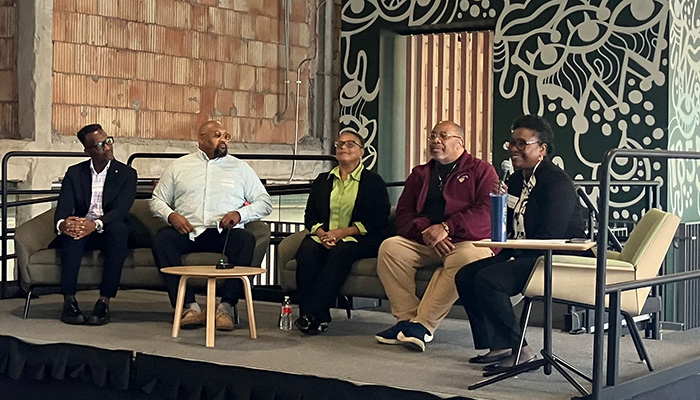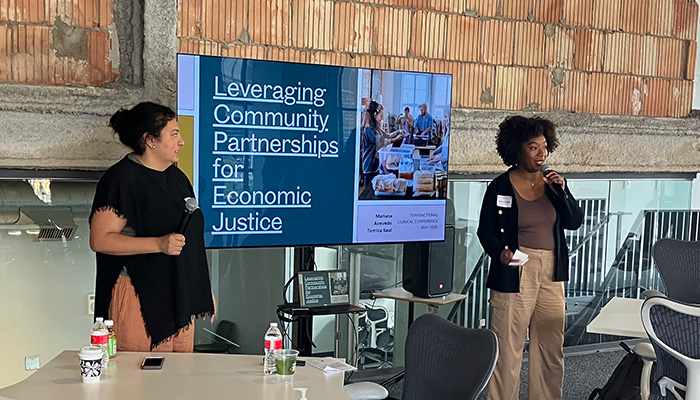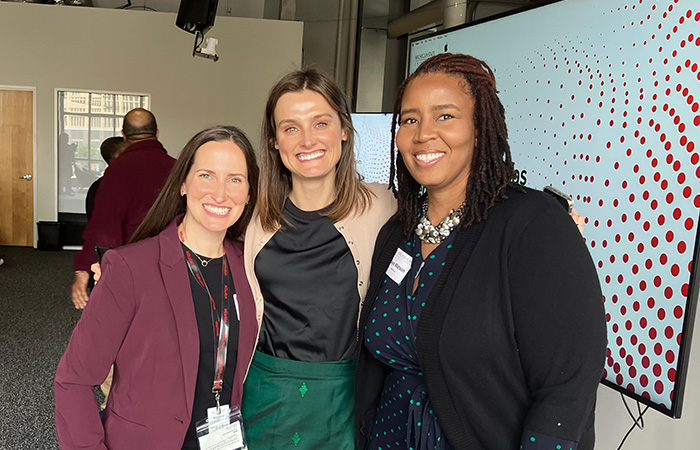
It might be time to rename the field of transactional law. At least that’s what Richard Grundy concluded when talking about his experience with transactional law clinics, including at his alma mater, Michigan State University and the University of Michigan.
Grundy is co-founder and CEO of JOURNi, a youth-centered tech education nonprofit based in Detroit that was among the inaugural clients of the Equitable Entrepreneurship and Innovation Law Clinic at MSU’s College of Law. Through the clinics, Grundy received legal aid and advice for his organization from law students.
“I’m not sure why it’s called ‘transactional’ because it’s actually relationship-based work,” he said. “It’s been incredibly helpful to have a community of attorneys who are proactive and help us prevent challenges as thought partners. Working with the clinics was a way for me to get to know attorneys and see how they care about the same things we care about. They’re genuine and authentic.”
Grundy shared these remarks as a panelist at the 21st Annual Transactional Clinical Conference, hosted by MSU College of Law in Detroit on May 20-21. He spoke alongside fellow Detroit-based leaders Mamba Hamissi, co-founder and co-owner of the award-winning restaurant Baobab Fare and Tracey Patterson, president and Randall Mosley (B.S. social science ’78), executive director of the Perry Outreach Center, a nonprofit and community resource center in the city’s southwest neighborhood.

Under the supervision of licensed attorneys, students who participate in transactional law clinics provide free or low-cost legal aid to entrepreneurs and organizational leaders who may not otherwise have access. This puts clients like JOURNi, Baobab Fare and the Perry Outreach Center at the heart of the work while providing students with hands-on experience.
As the opening keynote session, the panel discussion highlighted the benefits each received from university clinics and the value of transactional lawyers.
“Transactional lawyers are problem solvers,” Patterson said. “We worked with students at the Business and Community Law Clinic at Wayne State University and they helped us move through the process of starting a 501(c)(3) in less than three weeks — a process that we would’ve white-knuckled for months otherwise.”
Mosley added, “Sometimes we’re intimidated by the law, but it’s been an incredibly positive experience. These students are competent, efficient and made the experience all about change. When people see you have confident legal representation, with the i’s dotted and the t’s crossed, it’s a big deal — especially for a small nonprofit like ours.”
For Hamissi and his wife, who came to Detroit as refugees from Burundi, opening a small business was a way to achieve security. However, he said there were numerous uphill battles — from language barriers to understanding the intricacies of local and state laws.
“As a refugee, the one thing I’m afraid of is the law,” he said. “And you make a lot of mistakes when starting a business. So having someone to ask legal questions is peace of mind. The relationships that were developed through the clinic were critical because the students established trust and became advisors for me. I always send people to the clinics now because I know what’s waiting for them.”
Beyond the inspiring stories from clients, the Transactional Clinical Conference offers a space for clinical law professors, practitioners in government or private practice, professionals and students to come together to learn from one another, discuss innovations in the field and engage as a community.
“It’s important to be a community as clinicians,” said Kathryn Fort, director of clinics and director of the Indian Law Clinic at MSU College of Law. “The only way we can be lawyers at this time is to come together and talk about our role and how to continue improving transactional law.”

Co-chairs for the 21st Annual Transactional Clinical Conference were, from left, Kristin Wolff, clinical assistant professor of law in the Zell Entrepreneurship Clinic at the University of Michigan; Anne Choike, associate clinical professor of law and director of MSU College of Law’s Equitable Entrepreneurship and Innovation Law Clinic; and Maya Watson, assistant clinical professor and director of the Business and Community Law Clinic at Wayne State University.
Choike, who also served as co-chair for the event, worked with the entire planning committee to craft an experience centered on engagement.
“I’ve attended this conference since I first became a clinical law professor and it’s my favorite event because of the community,” she said. “It’s inspirational to connect with people doing very impressive work in our field. And our field is always changing. There are always better ways to serve our clients and our students, so it’s important to be able to support one another.”
The conference offered sessions on clinical pedagogy, transactional practice and the role of transactional law in advancing economic and social justice. One presentation brought in experts from the U.S. Securities and Exchange Commission to discuss expanding access to capital for clients.
Another featured a clinical professor assessing artificial intelligence as a lawyering and pedagogical tool, outlining promising opportunities to use AI for practicing negotiation and generating questions for client meetings. Many sessions showcased ways to empower and support students as the next generation of problem solvers.
Holding the event in Detroit was fitting with the theme as well. Known for its resilience, the Motor City is a community that’s driving change — much like transactional law clinics. The event took place at the Michigan State University Apple Developer Academy, an epicenter of innovation.
“The Apple Developer Academy is a unique partnership between Apple and MSU,” said the academy’s director, Sarah Gretter. “It’s the first and only Apple Developer Academy in the U.S. and we offer free programming to 200 learners every year on the basics of coding, design and entrepreneurship.”
This year’s sold-out event welcomed attendees from more than 45 leading law schools — including Harvard, Columbia, Duke and the University of Pennsylvania — to explore Detroit through excursions and tours of local cuisine, museums and cultural centers. The excursions were intended by the conference planning committee to foster deeper connections not only among attendees but also between participants and the host city.
One such excursion was a guided tour led by the Detroit Black Food Sovereignty Network of the Detroit Food Commons, which includes a community banquet hall, commercial kitchens and the Detroit People’s Food Co-op, a community-owned grocery store. The tour described DBCFSN’s mission to ensure that Detroit’s Black population plays a significant role in the local food movement and its experience working with legal clinics over the years.
“Through every step of this event,” she said, “we were trying to be engaged with the local community — featuring local caterers such as Norma G’s and supporting former clients, local entrepreneurs and organizations — because that’s what our work is all about. We want to change the system to better serve everyone.”
This story originally appeared on the College of Law website.